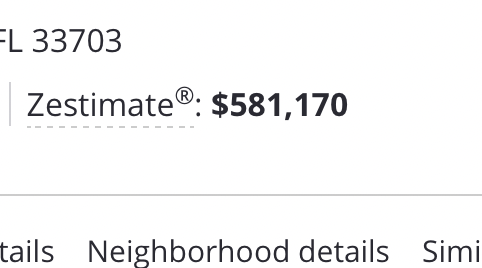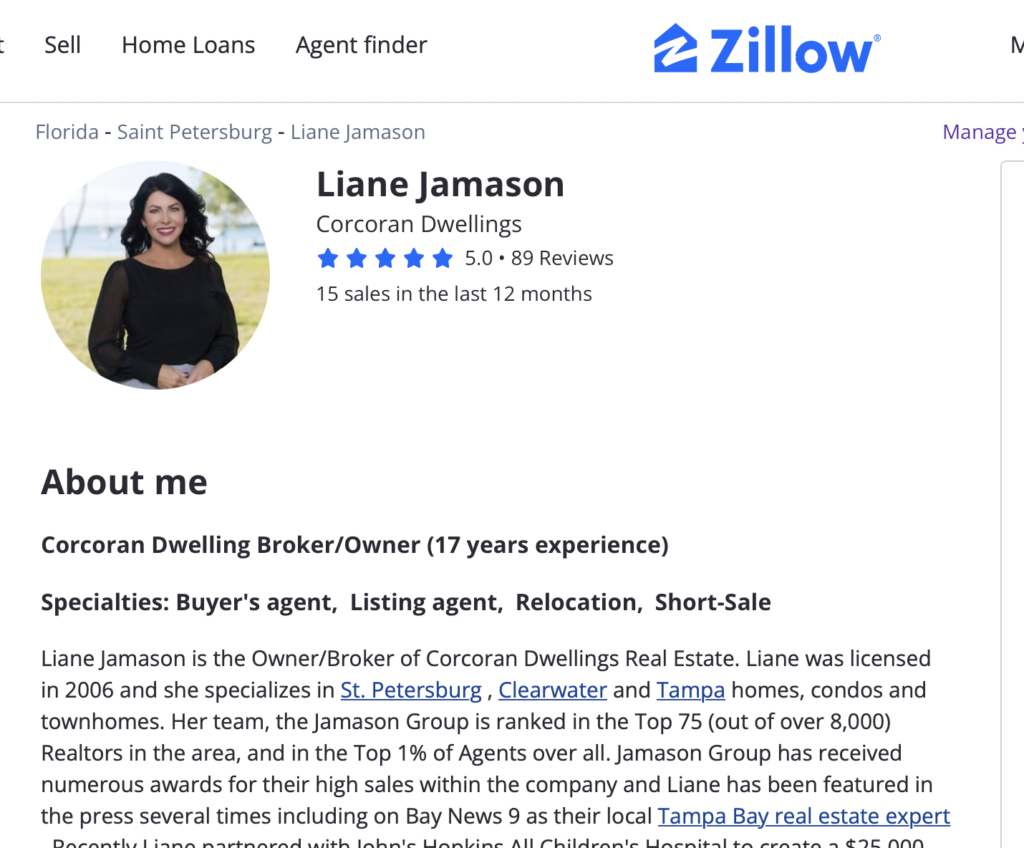Many real estate agents hate Zillow. Let me count the ways…
For years, real estate agents have had a love/hate relationship with Zillow. While it has a robust platform that our buyer’s love to use for searching, agents often find a ton of errors, which they then have to try to explain to their clients as to why Zillow is not the holy grail of real estate.
Oh that house you love for that killer price of $250,000 that says it’s a new listing? It’s not – it actually sold 2 years ago. Thanks, Zillow.
Oh your “Zestimate” says your home is worth $1,000,000? I’m here to tell you as a top St. Petersburg listing real estate agents, it’s not. It’s maybe worth $900,000. Or it could be worth more like $1,100,000. Here’s the thing – ZILLOW HAS NO IDEA WHAT YOUR HOUSE LOOKS LIKE ON THE INSIDE! Read that again.
Here’s a look at my house. It’s currently worth approximately $950,000-1,050,000 but check out what my Zestimate is, below. Because Zillow doesn’t know that I put nearly $100,000 into my kitchen, paint and flooring throughout.

For years, Zillow has asked real estate agents to syndicate our listings to their platform, for free mind you, sharing our data. We did so because we thought it best for our sellers, to have their listings advertised as many places as possible. So what did Zillow do? They decided to take our data, but then sell back ad space on the right hand side of the listing, making it appear as if some OTHER Realtor had the listing, and therefore got the property inquiry when someone asked about it. Some other real estate agents who is NOT the expert on the property. The listing agents info was buried lower down the page. Not cool, Zillow, not cool at all. But they are making thousands from real estate agents willing to pay for a Zip Code and be advertised on all the listings in that zip code.
Next, to add insult to injury – if you did buy a zip code as a real estate agents – now you are in competition with 3 other agents. That’s right – you don’t exclusively own that zip code – the leads go to 3 other real estate agents with whom you have to compete for that buyer. Now the buyer’s phone is ringing off the hook with agents calling who actually know nothing about that listing.
Let’s explore some of the main reasons why real estate agents and realtors may have mixed feelings about Zillow:
- Inaccurate home value estimates: One of the key features of Zillow is the “Zestimate,” which is a tool that provides an estimated value for homes based on various data sources. However, many real estate professionals believe that these estimates are often inaccurate, and can lead to confusion for consumers. In some cases, the Zestimate can be significantly lower or higher than the actual market value of a property, which can affect the perceived value of a home in the eyes of potential buyers.
- Incorrect property information: Another concern for real estate agents is the accuracy of the property information provided on Zillow. In some cases, the site may display incorrect information, such as outdated property features, incorrect square footage, or incorrect listing information. This can lead to confusion for consumers and can harm the reputation of the real estate agent.
- Competition with real estate agents: Zillow operates a platform that allows consumers to connect with real estate agents, and the site earns revenue from leads generated through this platform. Some real estate agents see this as a threat to their business, as Zillow is essentially competing with them for clients. Additionally, some real estate agents feel that Zillow’s lead generation model is not transparent and does not provide a level playing field for all agents.
- Reliance on third-party data: Zillow relies on third-party data to power its website, which can sometimes result in inaccurate information. For example, the site may not have access to the most up-to-date information about a property, such as recent renovations or upgrades, which can lead to inaccurate home value estimates.
- Loss of control: One of the biggest complaints from real estate agents about Zillow is that they have little control over the information that is displayed on the site. Real estate agents may have limited options for correcting incorrect information, and they have no control over how their listings are displayed or marketed on Zillow.

In conclusion, while Zillow has its flaws, it remains an important player in the real estate industry. Real estate agents who use the site effectively can benefit from its reach and marketing capabilities, while also addressing its limitations. As with any tool, it is important to understand its strengths and weaknesses, and to use it in a way that supports your business goals. Check out my Zillow profile. It, at least, can be a good tool for potential buyer and sellers to research real estate agents before choosing one to represent them in such a large financial transaction. However, I still think Google is most accurate when it comes to real estate agent’s reviews.


Leave a Reply